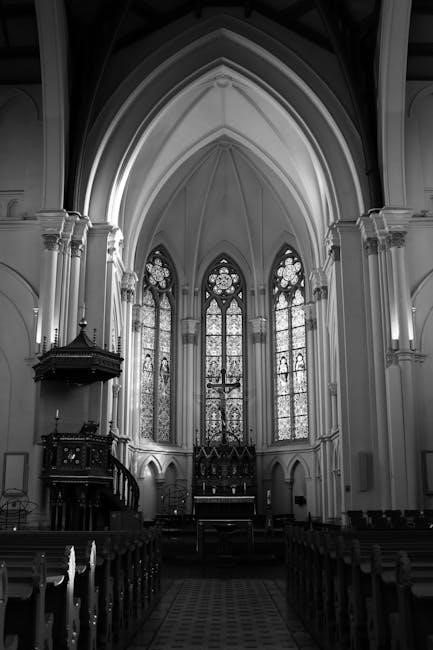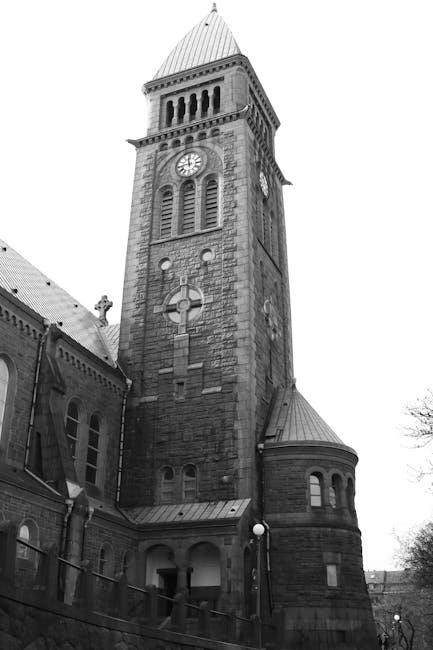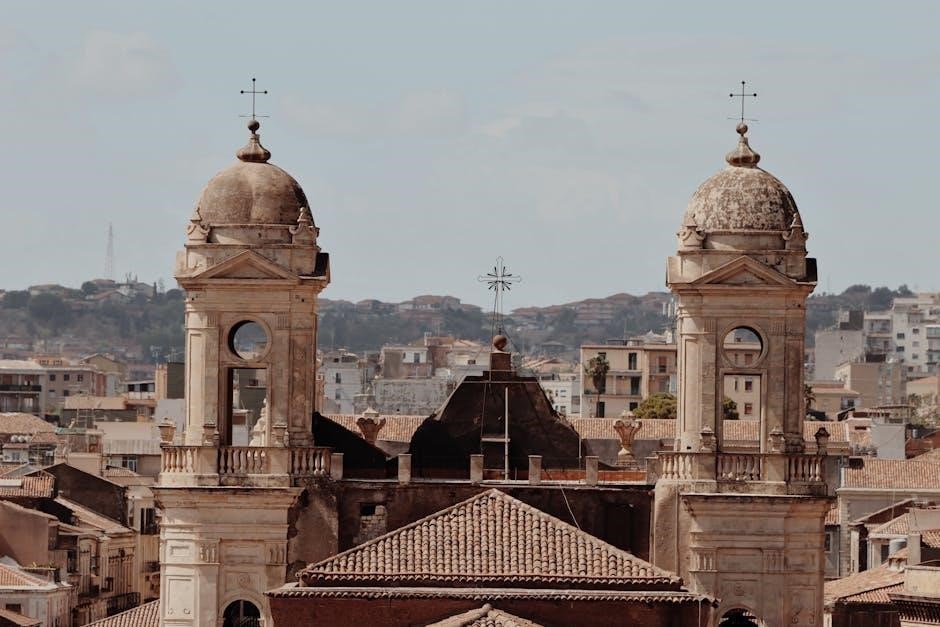
The 2024 Catholic Voters Guide equips Catholics with resources to make faith-informed decisions, emphasizing moral principles and social justice, while providing tools for evaluating candidates and issues.
Understanding the Role of Catholic Voters in the 2024 Election
Catholic voters play a pivotal role in shaping the 2024 election, bringing a unique perspective rooted in faith and moral principles. Their influence extends across key issues like abortion, religious liberty, and economic justice, reflecting the Church’s teachings. As the U.S. approaches critical decisions, Catholic voters are divided on volatile social matters, highlighting the complexity of their engagement. The Catholic community’s active participation is essential, as their votes can significantly impact the nation’s direction. With resources like the Florida Conference of Catholic Bishops (FCCB) guide, Catholics are equipped to evaluate candidates and policies through a faith-informed lens, ensuring their decisions align with moral values and social justice.
The Importance of Faith-Informed Decision-Making
Faith-informed decision-making is a cornerstone of Catholic voting, guiding believers to align their choices with moral teachings. The Catechism of the Catholic Church emphasizes forming conscience through prayer, scripture, and Church doctrine. This approach helps Catholics evaluate complex issues like abortion, religious liberty, and economic justice. By prioritizing faith, voters can discern candidates’ stances and policies that reflect Christian values. The U.S. bishops encourage Catholics to use their conscience as a moral compass, avoiding decisions that contradict core beliefs. Faith-informed decision-making empowers Catholics to contribute to a society that upholds human dignity and justice, fulfilling their responsibility to shape a morally grounded future.

Key Moral and Ethical Principles for Catholic Voters
Catholic voters prioritize moral principles rooted in the Catechism, focusing on the sanctity of life, dignity of all persons, and justice, guiding their electoral decisions.
The Catechism of the Catholic Church and Voting
The Catechism of the Catholic Church serves as a moral compass for Catholic voters, offering teachings on life, dignity, and justice. It emphasizes the sanctity of life, care for the poor, and the importance of conscience formation. The Catechism guides voters to evaluate policies and candidates through the lens of Catholic doctrine, ensuring decisions align with Church teachings. By referencing the Catechism, Catholics can better understand their moral responsibilities in elections, focusing on issues like abortion, religious freedom, and social justice. This resource helps voters discern how to uphold Catholic values in their choices, ensuring faith-informed decision-making at the polls;
Formation of Conscience: Guidelines for Catholic Voters
Formation of conscience is a vital process for Catholic voters, enabling them to make morally informed decisions. This involves prayer, reflection on Church teachings, and discernment of candidates’ stances on key issues. Catholics are encouraged to evaluate policies through the lens of dignity of life, social justice, and care for the vulnerable. The Church emphasizes the importance of voting with a well-formed conscience, guided by moral principles rather than party loyalty. Voters are also advised to consider the “lesser of two evils” framework when faced with imperfect candidates. Ultimately, this process helps Catholics align their votes with their faith, ensuring they act as responsible stewards of society.
Major Issues Impacting Catholic Voters in 2024
Key issues include abortion, religious liberty, immigration, and economic justice, shaping Catholic voters’ decisions in 2024 and reflecting their faith’s moral and social teachings.
Abortion and the Sanctity of Life
Abortion remains a central issue for Catholic voters, as the Church unequivocally upholds the sanctity of life from conception to natural death. The Catechism of the Catholic Church emphasizes the moral imperative to protect the unborn, influencing many Catholics to prioritize this issue in elections. Resources like the Florida Conference of Catholic Bishops’ Voting Guide and the Parish Pastoral Council for Responsible Voting (PPCRV) provide frameworks for evaluating candidates’ stances on life issues. These guides underscore the importance of conscience formation and the duty to support policies that defend human dignity. For Catholic voters, abortion is not just a political issue but a moral one, deeply tied to their faith and social justice commitments.
Religious Liberty and Freedom of Conscience
Religious liberty and freedom of conscience are cornerstone principles for Catholic voters, as they directly impact the ability to live out faith in public life. The Catholic Church teaches that religious freedom is a fundamental human right, essential for a just society. Resources like the Florida Conference of Catholic Bishops’ Voting Guide highlight the importance of supporting candidates who uphold these values. The Church also emphasizes the duty to act according to a well-formed conscience, guided by moral teachings. Issues such as conscience protections for healthcare workers and the rights of religious institutions to operate freely are critical considerations for Catholic voters in 2024, aligning with the broader call to defend human dignity and moral truth in society.
Immigration and the Dignity of All Persons
Immigration is a critical issue for Catholic voters in 2024, as it directly relates to the dignity of all persons and the Church’s teachings on social justice. The Catechism of the Catholic Church emphasizes the moral obligation to welcome the stranger and protect the vulnerable. Catholic voters are called to support policies that uphold human rights, ensure family reunification, and provide pathways to citizenship for undocumented immigrants. Resources like the Florida Conference of Catholic Bishops’ Voting Guide highlight the importance of evaluating candidates’ positions on immigration through the lens of Catholic social teaching. By advocating for just and compassionate immigration policies, Catholics can help build a society that respects the inherent dignity of all people, regardless of their nationality or status.
Economic Justice and Care for the Poor
Economic justice and care for the poor are cornerstone principles for Catholic voters in 2024, rooted in the Church’s teachings on human dignity and solidarity. The Catechism of the Catholic Church emphasizes the moral duty to prioritize the needs of the most vulnerable, ensuring access to essential resources like healthcare, education, and fair wages. Catholic social teaching calls for policies that reduce inequality, promote the common good, and protect workers’ rights. Voters are encouraged to evaluate candidates’ commitments to addressing poverty and fostering economic systems that serve all people, especially the marginalized. This aligns with Pope Francis’ call to build an economy that prioritizes human dignity over profit.

The Catholic Church’s Teachings on Social Justice
The Catholic Church emphasizes dignity, compassion, and the common good, guiding voters to prioritize policies that uplift the marginalized and promote equality, as outlined in the Catechism and Pope Francis’ teachings.
Pope Francis’ Encyclicals and Their Relevance to Voting
Pope Francis’ encyclicals, such as Laudato Si’ and Fratelli Tutti, emphasize care for creation, human dignity, and social justice, offering moral guidance for voters. These teachings highlight the importance of environmental stewardship, economic justice, and compassion for the marginalized. By addressing global inequalities and the common good, they provide a framework for evaluating policies and candidates. The Florida Conference of Catholic Bishops (FCCB) and other resources align with these principles, encouraging Catholics to prioritize ethical considerations in their voting decisions. Pope Francis’ call to action reminds voters to use their conscience to promote a more just and equitable society, reflecting the Church’s commitment to faith-informed civic engagement in the 2024 election.
The US Bishops’ Statement on Conscience and Voting
The US Catholic bishops emphasize the importance of conscience formation in voting, urging Catholics to align their decisions with moral teachings. They highlight key principles such as the sanctity of life, religious freedom, and care for the poor. The bishops encourage voters to assess candidates’ stances on critical issues like abortion, immigration, and economic justice. They also remind Catholics to seek guidance from the Catechism and Church doctrine when evaluating complex moral dilemmas. By prioritizing faith-informed decision-making, the bishops aim to empower Catholics to contribute to a more just and compassionate society in the 2024 election. This approach reflects the Church’s commitment to ethical leadership and civic responsibility.

Resources for Catholic Voters in 2024
The Florida Conference of Catholic Bishops (FCCB) Voting Guide and Parish Pastoral Council for Responsible Voting (PPCRV) provide essential tools for faith-informed decision-making in the 2024 election.

The Florida Conference of Catholic Bishops (FCCB) Voting Guide
The Florida Conference of Catholic Bishops (FCCB) Voting Guide is a trusted resource for Catholic voters, offering insights into candidates’ positions and party platforms. It aligns with Catholic teachings, emphasizing moral principles such as the sanctity of life, religious liberty, and care for the poor. The guide provides biblical and doctrinal references, helping voters form a conscience guided by faith. By focusing on issues like abortion, immigration, and economic justice, the FCCB equips Catholics to make informed decisions that reflect their values. This resource is part of a broader effort to ensure Catholics engage responsibly in the 2024 election, shaping a society rooted in justice and compassion.
Parish Pastoral Council for Responsible Voting (PPCRV)
The Parish Pastoral Council for Responsible Voting (PPCRV) is a non-partisan Catholic organization dedicated to promoting faith-informed civic engagement. It focuses on voter education, poll watching, and voter verification to ensure fair and transparent elections. PPCRV emphasizes the importance of conscience formation and moral decision-making among Catholic voters. By providing resources and training, it empowers parish communities to actively participate in the democratic process. PPCRV also collaborates with other Catholic groups to promote the Church’s teachings on social justice and human dignity. Its efforts aim to inspire Catholics to vote with integrity, reflecting their faith values in the 2024 election and beyond.

How to Evaluate Candidates as a Catholic Voter
Evaluating candidates involves assessing their alignment with moral principles, party platforms, and the Church’s teachings. Prioritize conscience formation, compare party positions to Catholic doctrines, and apply the ‘lesser of two evils’ framework when necessary.
Assessing Party Platforms Through a Catholic Lens
Evaluating party platforms through a Catholic lens involves aligning them with the Church’s moral and social teachings. Catholics are encouraged to examine each party’s stance on critical issues such as abortion, religious liberty, immigration, and economic justice. The Catechism of the Catholic Church and statements from the U.S. bishops provide guidance for discerning which policies uphold human dignity and the common good. Voters should prioritize platforms that reflect the principles of life, family, and care for the poor. This process helps Catholics make informed decisions that align with their faith, ensuring their votes contribute to a morally just society.
Using the “Lesser of Two Evils” Framework

The “lesser of two evils” framework guides Catholic voters in elections where no candidate fully aligns with Catholic teachings. It involves evaluating which candidate’s policies pose fewer moral risks and greater alignment with Catholic values. This approach emphasizes conscience formation, urging voters to prioritize issues like life, family, and social justice. The U.S. Catholic bishops have encouraged this method, advising Catholics to weigh the moral implications of each choice. While not ideal, this framework helps voters navigate complex political landscapes, ensuring their decisions reflect faith-informed principles and contribute to the common good. It is not about compromising values but making the most morally sound decision possible.

Catholic Voting Patterns in Past Elections
Historical trends show Catholic voters as a swing group, often divided on issues like abortion and religious liberty, influencing election outcomes significantly.
Historical Trends and Their Implications for 2024
Catholic voters have historically been a swing demographic, often divided on key social and moral issues. In past elections, their support has shifted based on candidates’ alignment with Church teachings on life, family, and social justice. The 2020 election highlighted this trend, with significant divisions over issues like abortion and religious liberty. As the 2024 election approaches, these patterns suggest that Catholic voters could again play a pivotal role in shaping outcomes. Their decisions are likely to be influenced by candidates’ stances on moral and ethical issues, as well as broader societal concerns. Understanding these trends is crucial for anticipating how Catholics may vote in 2024 and beyond.

Global Perspectives on Catholic Voting

Catholic voters worldwide, including Polish and Ukrainian Americans, may significantly influence the 2024 election, reflecting global concerns and values shaped by Church teachings and cultural identities.
The Role of Polish and Ukrainian American Catholics in 2024
Polish and Ukrainian American Catholics are expected to play a significant role in the 2024 election, bringing unique cultural and faith perspectives to the voting process. Many within these communities are deeply committed to Catholic teachings on issues like religious liberty, life, and social justice. Their influence may be particularly felt in key battleground states, where their votes could tip the balance. These communities often prioritize values such as family, morality, and compassion, aligning closely with the Church’s social doctrine. Additionally, their experiences with persecution and migration may shape their views on immigration and human dignity. As a result, Polish and Ukrainian American Catholics are not only influential voters but also active advocates for faith-informed policies in 2024.
Catholic voters are called to shape the future with faith-informed decisions, guided by moral principles and conscience, ensuring a society rooted in justice, compassion, and dignity for all.
Catholic Voters’ Responsibility in Shaping the Future
Catholic voters bear a profound moral duty to shape society through their votes, guided by faith and conscience. By prioritizing issues like life, dignity, and justice, they can influence policies that reflect Catholic values. The 2024 election presents a critical opportunity to address abortion, religious liberty, and economic justice. Catholics must stay informed, pray for discernment, and engage in civic processes. Their votes can uphold human dignity and promote the common good, ensuring a future where moral principles guide public life. This responsibility is not just a right but a sacred obligation to contribute to a society that values compassion, freedom, and the well-being of all.
A Call to Action: Engaging in the 2024 Election
Catholic voters are urged to actively engage in the 2024 election by prayerfully discerning their choices and advocating for policies aligned with Catholic teachings. Educating oneself about candidates’ positions and party platforms is essential. Participating in voter registration drives and supporting initiatives like the Florida Conference of Catholic Bishops’ Voting Guide can amplify Catholic values; By voting with a well-formed conscience, Catholics can help shape a society that upholds the dignity of life, religious freedom, and economic justice. Every vote carries the power to influence the future, making this election a critical moment for faith-informed action and moral leadership.